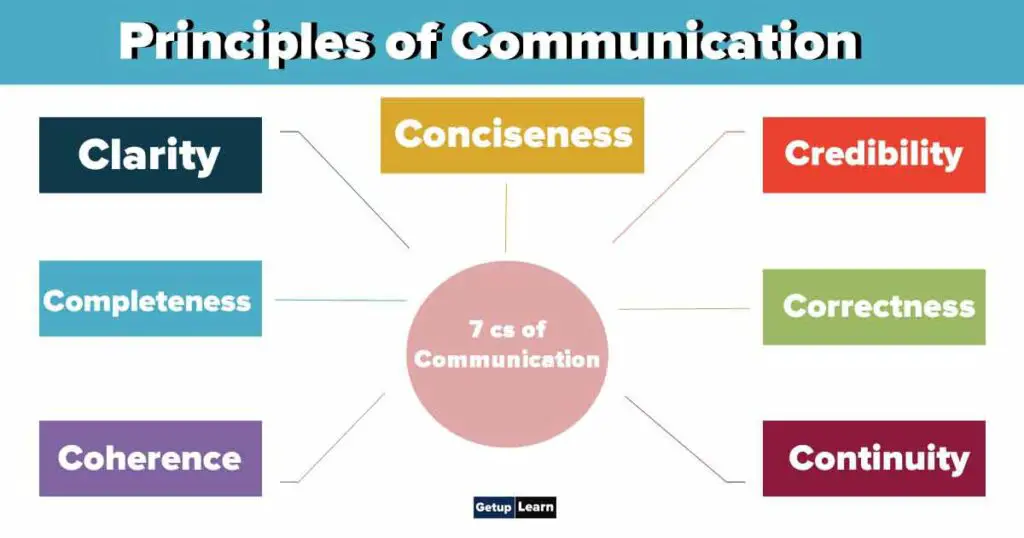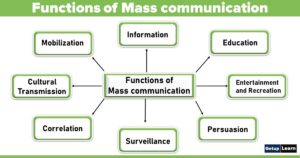Table of Contents
What are the 7 principles of communication?
Written communication occupies an important position in the communication sphere, so written communication has to pay adequate attention to certain principles of necessity. The essentials of every written communication are principles of unity, coherence, and emphasis. These principles along with other essentials of effective communication, like language, planning, and organization make written communication effective.

Table of Contents
Principles of Communication
These are the principle of communication or 7 Cs of communication:

Clarity
The writing should be correctly planned and expressed in a logical way, and the writer should make sure that the ideas flow smoothly from beginning to end. The message must be so clear that even the dullest man in the world should readily understand it.
The communicator must be very clear about all the aspects of the idea in his mind and about the purpose for which it is to be communicated. Next to it, he must be clear about the selection, suitability, and usage of the medium. The signals of the encoded message must be carefully composed of and transmitted well.
Clarity of written language is the first and foremost emphasis one should seek in writing. So clarity of language is a form of courtesy. Clarity, therefore, can be achieved in writing by taking pains by writing to serve the purpose rather than to impress readers.
Understanding the subject bring about clarity in the writing. Don’t jump about from one part of the writing to another and then back to the first aspect.
This is confusing for you and the reader. Deal with each aspect separately and clearly. The clear description brings about the script alive, takes readers to where you have been, and evokes atmosphere. It can bring flavor to the aridest and dry news story and make the difference between a report that satisfies and one that does not.
Completeness
Completeness is an essential factor for effective communication. A message must be organized appropriately in the sense that it must include all the important ideas and their details. The contents of the message must be checked in order to verify that there is no omission of the relevant details.
An incomplete message can do little to convey the information and persuade the receiver. All the aspects of the message must be grouped and brought together in a logical sequence to prepare meaningful thought units. The communicator’s effort can be more fruitful and effective if the receiver easily reacts to the sender’s message.
The incomplete messages may create doubts in the receiver’s mind. The receiver of the incomplete message feels angry, confused, and irritated by it. The principles of unity or completeness apply at three levels; one, the individual sentences must be unified. Two, individual paragraphs must be unified and three the totality of the script must be unified.
Coherence
Coherency is equally essential for good written communication. Clear communication in simple sentences helps the reader to understand. Facts and figures must be stated plainly and in an intelligent manner. Relation and clarity are the two important aspects of coherence.
Coherence means, tying together several ideas, under one main topic in any paragraph. Smooth flow, lucidity, and transition aspects should be given effect and there should not be any scope for the reader to misinterpret, misread or misspell the message.
Coherence is given to a larger paragraph or section of a message and leads to purposeful communication where the writer is well received, read, understood, and acted upon by the reader.
Conciseness
Conciseness is an important factor in effective communication. It means saying all that needs to be said and no more. The aimless verbiage, unnecessary details, and heavy paragraphs make our communication ridiculous and ineffective. We must omit those words and sentences from our message, which are not likely to bring about results.
The message, which can be expressed in fewer words, is more impressive and effective than the same message expressed in a number of words. The communicator must organize his message in such a way that every word in it is meaningful and of interest to the receiver.
Even a single word or a sentence, which does not contribute to accomplishing the purpose of the communication, should be carefully omitted.
Conciseness refers to thoughts expressed in the fewest words consistent with writing. It is achieved by writing in a definite style and the use of precise words.
Credibility
Good writing is always forceful and direct and has the power and capacity to produce a reaction or desired effect. The clarity in writing brings about credibility because it ensures that others understand the message easily and quickly. A clear and direct approach to writing makes it possible to achieve the principle of credibility in your writing. Other essentials of writing like correctness and completeness add to the strength of credibility in the writing.
Correctness
Without correctness, readers may refuse your write-up. Communication must be correct in tone and style of expression, spelling, grammar, format, contents, statistical information; stress-unstressed, etc. there should not be any inaccurate statements in the message.
Efforts must be made to avoid errors in spelling, punctuations, etc. the incorrectly written documents lower the readers’ confidence in the writer.
In the same way, the incorrect statements and other miscellaneous errors of the speaker lower the listeners’ confidence in him and it may tarnish his image and reliability too. When the communication receiver finds one error he suspects that there can also be other errors in the message. Therefore, he starts searching for other mistakes automatically.
Therefore, it is essential that the sender should verify the correctness of the information before transmitting it to the receiver. And before accepting the information for important decision-making, the receiver should clarify his doubts regarding the accuracy and correctness of the message.
Continuity
As far as possible the writer should avoid jargon. Jargon is a language that is special to science, commerce, technology, trade, and profession. In writing, the jargon should not be incorporated as this could make the writing confusing and unclear. Brevity or the use of fewer words brings about continuity and grace in your writing.
The effect of good writing depends on its style and continuity of subject till the conclusion. If one takes care to be precise, correct, and clear in writing and if the continuity is maintained throughout the writing, the desired effect from the reader is achieved.
Read More Related Articles
[su_spoiler title=”What is Communication? | Mass Communication” style=”fancy” icon=”plus-circle”]
What is Communication?
[/su_spoiler]
[su_spoiler title=”Types of Communication | Principles of Communication” style=”fancy” icon=”plus-circle”]
-
Types of Communication
- Verbal Communication
- Non-Verbal Communication
- Written Communication
- Visual Communication
- Feedback Communication
- Mass Communication
- Group Communication
Principles of Communication
[/su_spoiler]
[su_spoiler title=”Nonverbal Communication | Verbal Communication” style=”fancy” icon=”plus-circle”]
[/su_spoiler]
[su_spoiler title=”Written Communication | Oral Communication” style=”fancy” icon=”plus-circle”]
Written Communication
[/su_spoiler]
[su_spoiler title=”Business Communication | Organizational Communication” style=”fancy” icon=”plus-circle”]
[/su_spoiler]
[su_spoiler title=”Formal Communication | Informal Communication” style=”fancy” icon=”plus-circle”]
[/su_spoiler]
[su_spoiler title=”Interpersonal Communication | Informal Communication” style=”fancy” icon=”plus-circle”]
[/su_spoiler]
[su_spoiler title=”Downward Communication | Upward Communication” style=”fancy” icon=”plus-circle”]
[/su_spoiler]
[su_spoiler title=”Barriers to Communication | Horizontal or Lateral Communication” style=”fancy” icon=”plus-circle”]
[/su_spoiler]
[su_spoiler title=”Self Development | Effective Communication” style=”fancy” icon=”plus-circle”]
[/su_spoiler]
[su_spoiler title=”Difference Between Oral and Written Communication | Theories of Communication” style=”fancy” icon=”plus-circle”]
[/su_spoiler]
What are the 7 principles of communication?
The 7 principles of communication are Clarity, Completeness, Coherence, Conciseness, Credibility, Correctness, Continuity.
How many principles of communication are there?
These are the principle of communication or 7 Cs of communication: Clarity, Completeness, Coherence, Conciseness, Credibility, Correctness, Continuity.
What are the objectives and principles of communication?
Written communication occupies an important position in the communication sphere, so written communication has to pay adequate attention to certain principles of necessity. The essentials of every written communication are principles of unity, coherence, and emphasis. These principles along with other essentials of effective communication, like language, planning, and organization make written communication effective.














